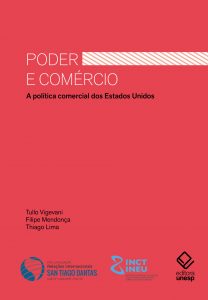International Relations Experts debate US Trade Policy
The discussion basis of this book focuses on North American institutions for the formulation and execution of foreign trade, taking into account historical issues since the interwar period

In the face of the current challenges of multilateral trade worldwide, with the threat of tariff wars on all sides, it may be useful to ask: How have the international trade policies of the United States developed in recent decades? Tullo Vigevani, Filipe Mendonça and Thiago Lima set out to answer this and other questions in Power and Trade – United States Trade Policy [Poder e comércio – A política comercial dos Estados Unidos], published by Editora Unesp.
“This book discusses a central issue: the United States’ international trade policy, focusing attention on the institutions that formulate it and the delivery mechanisms”, the authors write. “Therefore, international relations, economic policies, conceptual issues of international trade, the American economy, institutions, administration, Congress and society will all be considered”.
Throughout the 11 chapters, divided temporally, the authors bring light to long-term issues, such as the challenges and opportunities perceived by the main trade policy agencies (USTR, Departments of Commerce, Agriculture, Treasury and State) that emerged after the end of the Cold War or how the constraints, created by domestic policy, especially the Congress, on international trade policy, have changed through the years.
“We can say the methodology of this book is similar to that of great narratives and was used on the same way as documentary research. It also dialogues with theories of international relations and international trade”, the authors write. “We understand that, through the great narratives, it is possible to identify the long-term structural institutions and to understand the reasons behind changes. The forces that have acted and act for changes in the United States’ international trade policy are connected with long-term processes that cannot be explained by cyclical changes, since even these have their importance.”
The book is part of the International Studies Collection, with more than 20 titles dedicated to the study of major themes related to politics, economics and society.
About the Authors

Tullo Vigevani is a retired professor at the Faculty of Philosophy and Sciences of Universidade Estadual Paulista (Unesp). He coordinates projects in the International Relations. He is a researcher at the Center for the Study of Contemporary Culture (Cedec) and the National Institute of Science and Technology for Studies on the United States (INCT – Ineu). He has published numerous books and articles on Brazilian foreign policy, trade and regional integration, and international relations theory in Brazil, the United States, China, Argentina, and other countries.

Filipe Mendonça is a researcher at Cedec and INCT – Ineu. He is a professor at the Federal University of Uberlândia (UFU) and coordinator of the Nucleus of Studies and Research in International Relations (Nepri – UFU). He has published books and articles on International Relations Theory, with particular emphasis on US trade policy.

Thiago Lima teaches in the Department of International Relations and the Postgraduate Program in Public Management and International Cooperation of the Federal University of Paraíba (UFPB). He is a researcher at INCT – Ineu and coordinator of the Research Group on Hunger and International Relations (FomeRI) of UFPB. Winner of the Capes Thesis Award in Political Science and International Relations in 2015, he published the book Agricultural Protectionism in the United States (Editora Unesp, 2018).
Title: Power and Trade – United States Trade Policy [Poder e comércio – A política comercial dos Estados Unidos]
Authors: Tullo Vigevani, Filipe Mendonça, Thiago Lima
Number of pages: 457
Format: 16 x 23 cm
ISBN: 978-85-393-0713-5
Rights: worldwide free
